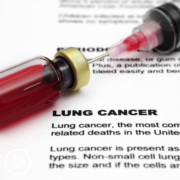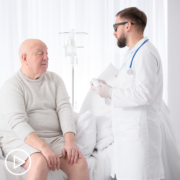How Do Lung Cancer Patients Benefit From MRD Testing?
How Do Lung Cancer Patients Benefit From MRD Testing? from Patient Empowerment Network on Vimeo.
MRD testing is another tool in the lung cancer care toolkit. Expert Dr. Christian Rolfo from Mount Sinai explains how MRD testing aids in patient monitoring, use of liquid biopsies in patient care, and updates about immunotherapy for early stage lung cancer.
See More from Best Lung Cancer Care
Related Resource:

|

|

|
Transcript:
Dr. Nicole Rochester:
There are a few questions from our audience that I would love to present to you, and so one of them comes from MacKenzie and MacKenzie asked, “Can you speak about MRD testing and what that means for lung cancer?”
Dr. Christian Rolfo:
Yeah, and that we were discussing briefly. So minimal residual disease is the…as I say, when we have an operation, we can have the opportunity to have completely resected a tumor, but we don’t know more than with the CT scan when the patient will recover. So we are without an answer believing every follow-up visit what has happened, seeing if it has gone. So we are trying to reduce this…reduce the anxiety first of all, to try to get the tools that are able to identify patients that they can recurrence, have a recurrence so liquid biopsies, one of them, and we have now the several methods that are trials and several data coming that there are some companies that actually they are a market for some of the options, we are still having validations, required validations, but we will certainly be there very shortly in time to identify these patients and to treat them in the proper time.
Dr. Nicole Rochester:
Wonderful, and I think you just addressed a question that came in from Harold, which was., “Is liquid biopsy playing a role in monitoring disease recurrence in lung cancer?”
Dr. Christian Rolfo:
Sure, we are actually tailoring treatments and checking the patients, and I have several, several experiences in patients that they’re monitoring over the time, and we have actually some of the vendors that are proposing this approach monitoring, liquid biopsy is a great tool because it’s minimally invasive, it’s just a blood draw, and we can continue. Not all the patients have the possibility in terms of they are not all cheaters, that is something we need to know DNA, so it’s the majority of them, we can do it in some minimal proportion, we cannot do it when there are also possibilities to follow them.
Dr. Nicole Rochester:
And our last question from the audience comes from Laura, and she wants to know, “Are immunotherapy combinations in the metastatic setting, expanding to treat earlier stage lung cancer?”
Dr. Christian Rolfo:
Yeah, absolutely, we have actually an FDA approval for us, one of the immunotherapeutic drugs in patients after the resection of the disease with some characteristics, but we are there and actually we are having more and more clinical trials using in earlier stages so we will say in the other stage from the earlier stage from that is the neoadjuvant, and we call that when we are doing a treatment to reduce two months to be operated later on, so we have also some trials that are going there, but we have an approval already for the adjuvant setting that is after the surgery in some patients.
Dr. Nicole Rochester:
That’s wonderful. You’ve given us a lot of good news. A lot of hopeful news, Dr. Rolfo, it is time for us to wrap up. I want to thank you again for being here for sharing your expertise.










